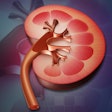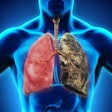
Current smokers who met the National Lung Screening Trial (NLST) criteria for CT lung cancer screening were less likely to participate in general medical checkups and colon cancer screening exams than those who did not in a study from South Korea that was published online October 22 in PLOS One.
Prior research has shown that individuals who smoke shy away from medical evaluations and cancer screening exams more often than nonsmokers, despite typically being at a higher risk for cancer. This pattern underscores the need to investigate barriers to screening among smokers as well as identify ways to increase acceptance and uptake in this population, noted lead author Dr. Eun Young Kim, PhD, and colleagues from Gachon University College of Medicine.
For their study, the researchers examined trends in adherence to basic medical checkups and cancer screening guidelines among individuals who either did or did not meet the eligibility criteria used in the NLST. The criteria include adults aged 55 to 74 years with a smoking history of 30 or more pack years who smoked within the past 15 years.
The group drew the data from the 2010 to 2012 Korea National Health and Nutrition Examination Surveys, which consisted of a combination of health questionnaires, nutrition surveys, and health examinations. Among 5,480 individuals included in the study, 16.8% met the NLST eligibility criteria. The researchers further subdivided the NLST cohort into current and former smokers.
Upon analyzing the data, they found that current smokers who met the NLST criteria were considerably less likely to undergo a general medical checkup (odds ratio of 0.7) and colon cancer screening (odds ratio of 0.59) than the control group (i.e., those who did not meet the NLST criteria), even after adjusting for sociodemographic factors, comorbidities, and other variables.
They also discovered that current smokers were less inclined to participate in stomach, breast, and cervical cancer screening exams compared with both the control group and former smokers who met the NLST criteria, though the differences for these exams did not reach statistical significance.
| Medical exam adherence among individuals by NLST criteria | |||
| Non-NLST (control) | NLST (former smokers) | NLST (current smokers) | |
| General medical checkup* | 71.6% | 70.2% | 64.2% |
| Colon cancer screening* | 59.1% | 61.8% | 46.1% |
| Stomach cancer screening | 59.9% | 59.3% | 52.8% |
| Breast cancer screening | 59.2% | 74.4% | 40.5% |
| Cervical cancer screening | 48.9% | 74.7% | 36% |
In contrast, former smokers who met the NLST criteria were just as likely as the control group to participate in medical checkups and basic cancer screening exams. Former smokers who met the NLST criteria were actually two times more likely to undergo breast cancer screening and three times more likely to undergo cervical cancer screening than the control group.
"Understanding the screening practice patterns for this target population that is subject to lung screening recommendations might enable the development of more effective plans to implement lung screening as well as to improve screening compliance for other cancers," the authors concluded.




















